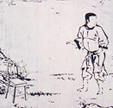Democracy, Debt, and Signing Statements
• “Starve the beast.” That’s the expression created by hyper-right-winger Grover Norquist for the strategy to eliminate federal programs opposed by the far right. “I don’t want to abolish government,” he told Mara Liasson on National Public Radio. “I simply want to reduce it to the size where I can drag it into the bathroom and drown it in the bathtub.”
The right talks about smaller government as if that is automatically a good thing. Is it? If a tsunami devastates the east coast in 2008, do we want the federal government to sit on its hands because small government is best? I certainly hope a bird flu pandemic never materializes. But if it does, do we want the National Centers for Disease Control to watch from the sidelines because they don’t have enough money? Suppose taxes are cut repeatedly in the course of an indefinite war. Might the citizens eventually be compelled to choose between Social Security and national security?
Governments, according to the Declaration of Independence, derive their just powers from the consent of the governed. Thomas Jefferson, the author of that quaint formulation, also believed that the national debt undermines sovereignty because debt limits options. Debt forces upon future generations obligations to which they did not and could not consent. That is precisely why the anti-American right is driving the country deeper and deeper into debt. They want to “starve the beast” by establishing national peonage.
• When a President signs a bill into law, he may also issue a signing statement presenting his interpretation of the law and its enforcement. Such statements, once relatively rare, have been issued with increasing frequency in the past three decades, and particularly in the past five years. Since taking office, George Bush, Jr. has turned signing statements into a showdown on Constitutional powers. Ostensibly on constitutional grounds, with little fanfare and less press coverage, Bush has dismissed some 600 provisions of laws that he signed into effect.
He hasn’t vetoed anything. But in statement after statement, he has offered the opinion that as President, he simply is not bound by this clause or that provision. He signed the McCain anti-torture bill along with a statement exempting elements of the executive branch at his discretion. He renewed the so-called Patriot Act with a statement that the executive branch was not bound by the Act’s reporting requirements. He contends that if a law impairs the performance of his duties, he doesn’t feel obliged to obey it.
Presidents, however, don’t have the last say on such matters. In olden times, that was the province of the Supreme Court. In olden times, Congress ratified treaties, declared war, and made laws “necessary and proper” for the execution of presidential powers.
Step back for a moment and imagine some other President — an evil, non-Bush President in the future. Do you believe that evil President should be able to pick and choose the laws he will enforce and obey? Does that sound like democracy to you? Do you think that’s what our founders had in mind?
____________________
The right talks about smaller government as if that is automatically a good thing. Is it? If a tsunami devastates the east coast in 2008, do we want the federal government to sit on its hands because small government is best? I certainly hope a bird flu pandemic never materializes. But if it does, do we want the National Centers for Disease Control to watch from the sidelines because they don’t have enough money? Suppose taxes are cut repeatedly in the course of an indefinite war. Might the citizens eventually be compelled to choose between Social Security and national security?
Governments, according to the Declaration of Independence, derive their just powers from the consent of the governed. Thomas Jefferson, the author of that quaint formulation, also believed that the national debt undermines sovereignty because debt limits options. Debt forces upon future generations obligations to which they did not and could not consent. That is precisely why the anti-American right is driving the country deeper and deeper into debt. They want to “starve the beast” by establishing national peonage.
• When a President signs a bill into law, he may also issue a signing statement presenting his interpretation of the law and its enforcement. Such statements, once relatively rare, have been issued with increasing frequency in the past three decades, and particularly in the past five years. Since taking office, George Bush, Jr. has turned signing statements into a showdown on Constitutional powers. Ostensibly on constitutional grounds, with little fanfare and less press coverage, Bush has dismissed some 600 provisions of laws that he signed into effect.
He hasn’t vetoed anything. But in statement after statement, he has offered the opinion that as President, he simply is not bound by this clause or that provision. He signed the McCain anti-torture bill along with a statement exempting elements of the executive branch at his discretion. He renewed the so-called Patriot Act with a statement that the executive branch was not bound by the Act’s reporting requirements. He contends that if a law impairs the performance of his duties, he doesn’t feel obliged to obey it.
Presidents, however, don’t have the last say on such matters. In olden times, that was the province of the Supreme Court. In olden times, Congress ratified treaties, declared war, and made laws “necessary and proper” for the execution of presidential powers.
Step back for a moment and imagine some other President — an evil, non-Bush President in the future. Do you believe that evil President should be able to pick and choose the laws he will enforce and obey? Does that sound like democracy to you? Do you think that’s what our founders had in mind?
____________________
Labels: George W. Bush, Grover Norquist, John McCain, national debt, signing statements, Thomas Jefferson, torture

